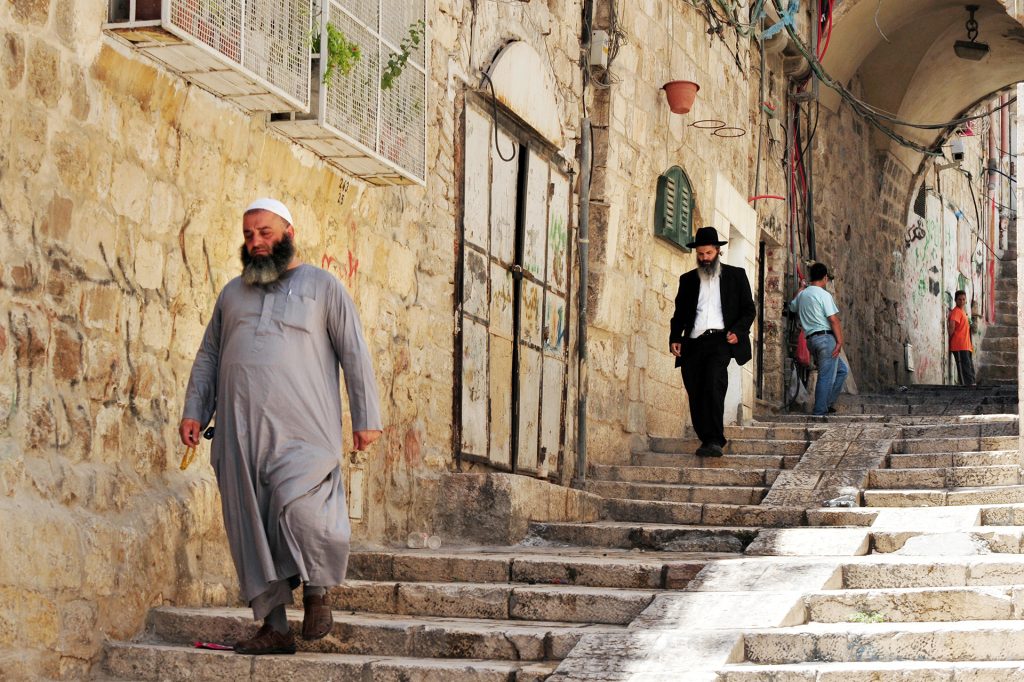Israel and Hamas – A conflict between brothers?
In numerous Bible studies, articles and sermons in recent decades, the conflict between Israel and the surrounding Arab nations, has been explained as an age-old fraternal dispute. A conflict that dates back to Isaac and Ishmael. Although Hagar and her son Ishmael are being sent away from the Promised Land, they are given promises and a blessing: ‘Behold, I will bless him, and will make him fruitful and will multiply him exceedingly; He shall become the father of twelve princes, and I will make him a great nation. But My covenant I will establish with Isaac’ (Genesis 17:20-21). This does not sound like a curse on Ishmael and his Arab descendants.
“But My covenant I will establish with Isaac”
Indeed, the Arab peoples have become extremely numerous. However, the covenant proceeds through Isaac and his later Jewish descendants, apparently providing a continuing source of jealousy and conflict. Since the coming of the Jewish Messiah Jesus Christ, however, a door has been opened for all peoples, including Arabs, to become full children of God through faith in Him. It is understandable to speak of a conflict between brothers, who have Abraham as a common ancestor. In a conflict between brothers, it can certainly get rough and there can be casualties. Yet reconciliation between brothers is always possible. The question arises whether the current conflict between Israel and Hamas can also be classified under this concept of a ‘fraternal conflict’. I am convinced that this, for several reasons, is absolutely impossible.
Amalek
There is another fraternal conflict in Genesis: between Jacob and Esau. In the Old Testament we read that, in the context of this fraternal dispute, Israel was often attacked by neighboring nations. But Amalek, descendant from Esau, crossed a border, for which he was eternally cursed. When the people of Israel were liberated from Egypt and passed through the Sinai desert, they were attacked by the Amalekites. Very cunningly, the people of Israel were attacked in the rear, where the weakest people walked, with the purpose of eventually killing all the people of Israel. It was a life-and-death struggle, and Moses, supported by Aaron and Hur, had to hold up his hands. In the end, Israel prevailed: ‘Then the LORD said to Moses, “Write this in a book as a memorial and recite it to Joshua, that I will utterly blot out the memory of Amalek from under heaven’” (Exodus 17:14). Amalek and his people are thus not just temporarily defeated but cursed forever.
In Deuteronomy 25:17-19, we read: “Remember what Amalek did to you along the way when you came out of Egypt: how he met you along the way and attacked among you all the stragglers at your rear when you were faint and weary; and he did not fear God. Therefore, it shall come about when the LORD your God has given you rest (…) you shall blot out the memory of Amalek from under heaven. You must not forget!”
What is the difference between Amalek and a fraternal dispute? Amalek did not aim to merely win a battle against Israel’s army or plunder a harvest. It was his goal to commit genocide, starting with the weak: the elderly and children. There lies the turning point where the fraternal dispute changed into a curse.
“It was his goal to commit genocide, starting with the weak”
Throughout the centuries, there have often been peoples who wanted to exterminate the entire nation of Israel: “They make shrewd plans against Your people (…) they have said, Come, come, and let us wipe them out as a nation, that the name of Israel be remembered no more” (Psalm 83:3-4). The Psalm also ends with Israel’s prayer: ‘Let them be ashamed and dismayed forever and let them be humiliated and perish’ (v. 17). Amalek so falls out of the category of ‘fraternal conflict’.
The dragon and the beast
We also read about an attempted genocide against Israel in the New Testament, in the end times. In a vision on the island of Patmos, the Apostle John sees a woman who is about to give birth to a son, who will ‘herd all the Gentile nations with a rod of iron’. That woman represents Israel, and the son represents Jesus Christ, who is born to the Jewish woman Mary. There is a dragon waiting to devour the child immediately after birth. The dragon represents Satan, who would prefer to devour Jesus, the Savior of the world. John then describes the child going up to God and His throne in heaven, and the woman fleeing from the dragon: “So the dragon was enraged with the woman and went off to make war with the rest of her children, who keep the commandments of God and hold to the testimony of Jesus” (Revelation 12:17). So, the dragon first aims to destroy the Jewish people and subsequently the Christians as well.
Then we read that a beast rises who receives all power from the dragon. Many people are impressed by this beast and worship it. There is going to be an impressive political leader, or a united group of leaders. This leader, this beast, is going to speak blasphemies: “And he opened its mouth in blasphemies against God, to blaspheme His name, and His tabernacle, that is those who dwell in heaven. And it was also given to him power to make war with the saints (…) All who dwell on the earth will worship him, everyone whose name has not been written from the foundation of the world in the book of life of the Lamb” (Revelation 13:6-8).
“Jesus Christ Himself will come in time to deal with the dragon and the beast and his followers”
These horrors, fortunately, do not have the last word. Jesus Christ Himself will come in time to deal with the dragon and the beast and his followers: “And the beast was seized, and with him the false prophet (…) and those who had received the mark of the beast and those who worshipped his image; these two were thrown alive into the lake of fire which burns with brimstone. And the rest were killed with the sword which came from the mouth of Him who sat on the horse’ (Revelation 19:20-21). Here we see that blasphemy of God, genocide against the Jewish people and persecution of Christians does not ultimately lead to reconciliation, but to curse. So, the beast and those who had received the mark of the beast don’t fit the category of a ‘fraternal dispute’, and there is no reconciliation.
Hamas
All aspects mentioned above regarding both Amalek and the beast also apply to Hamas. Its charter states that the ultimate goal is the total destruction of the ‘Zionist regime’ (= Israel), and the establishment of an Islamic caliphate, in which Christians also have no place. It is not appropriate to claim that Hamas is the beast from the Book of Revelation. We should not draw that conclusion. The conflict between Israel and Hamas is also too regional for that. Hamas may well be a ‘type’ of this beast, as there have been several of such ‘types’ throughout history. Notable in this context are the many pro-Hamas demonstrations in numerous Western cities.
“The ultimate goal is the total destruction of the ‘Zionist regime”
The Book of Revelation says that the beast “speaks blasphemies” and that many on earth “worship” the beast. Israel, therefore, does not have a fraternal dispute with Hamas, and Hezbollah in the North, but is waging a life-and-death struggle, just as Moses, Aaron and Hur waged a life-and-death struggle with Amalek. Israel’s survival is at stake. It’s comforting to know that God will protect His people when everything is at stake: “Salvation from our enemies and from the hand of all who hate us” (Luke 1:71).






